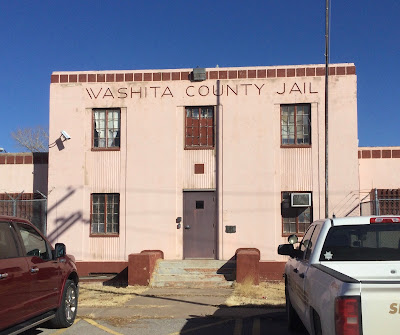With Cordell began a veritable avenue of Carnegies with four in a one hundred and sixteen mile stretch, the tightest bunch by far in Oklahoma. Twice I’d had stretches of over one hundred miles between Carnegies. And there would have been a fifth in this cluster if the town of Carnegie had fulfilled the requirements to earn a library.
The community had hoped by renaming itself in 1903 as Carnegie that would suffice to earn itself a library, but it wasn’t, perhaps because it had a population of less than a thousand at the time. It wasn’t the only town to rename itself to gain a Carnegie, as a town outside of Pittsburgh tried the same gambit, the birthplace of Mike Ditka, and succeeded. The name change may have caught Carnegie’s attention, but that wasn’t enough to win the town a library, as it was necessary to meet the strict guidelines Carnegie established for a grant, including passing a bond issue to maintain the library and to provide a piece of land for it near the town center.
She said there was a librarian in the 1940s, a Miss Annie Cardwell, who was a strict disciplinarian. People still talk about her, she said. She once told a young mother cradling her child that she couldn't check out a book of romance saying it wasn’t appropriate for her. She was also known to examine every returned book to see if any pages had been turned back. Woe to the patron who checked the book out if she she found any. She might have found the county jail just down the block from the Carnegie as just the place for such a person.
The last person on the sign-in sheet had been a week ago. The password was Vermont14. She had no explanation for it, as she said the head librarian was the one who chose it, which he regularly changed.
The library had not been expanded and only minimally modernized, though a second rest room had been added in the basement and there was an elevator in the back for the handicapped. The electric outlets were few. There was a charging station, which I could use for my batteries, but I needed to intrude on a strip of outlets so I could charge and use my iPad at the same time. I checked the weather to see if there had been any change in the prediction of a strong south wind all day. That was still the case, which wasn’t all bad, as I was turning east from Frederick and angling a bit north to Lawton, forty-six miles away.
I wanted to reach Lawton with ample time for its Carnegie and also the first McDonalds in over a week. There was still an occasional Walmart off in this sparsely settled region of Oklahoma, but not enough people for McDonalds to gain a foothold. The afternoon temperatures had been in the 70s, warm enough for shorts, and I wanted to take advantage of the McDonalds self-service ice dispenser. I arrived by four, but it was the first McDonalds of these travels with drive-through only. Fortunately the Taco Bell next door had inside-dining and also a self-serve ice dispenser, but no electric outlets for customers.
Now it’s another long haul, ninety-eight miles, to the next and final Carnegie in Oklahoma in Ardmore. Then it will be a quick forty-one miles to a Carnegie in Gainesville, Texas, one of five in the state that I have yet to visit. I had previously gotten to eight others in previous visits to the state. Texas had thirty-three Carnegies, but has torn down twenty of them, by far the highest percentage of any state other than Nevada which razed its lone Carnegie in Reno. So Texas, here I come.










No comments:
Post a Comment